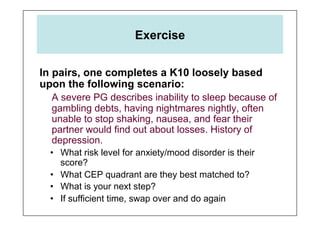
Problem gambling, also known as gambling addiction or compulsive gambling, is a serious mental health disorder that affects millions of people worldwide. It is characterized by the uncontrollable urge to gamble, leading to adverse consequences for the individual and their loved ones. In this article, we will explore the signs and symptoms of problem gambling, its causes, and effective management strategies.
Signs and Symptoms
Problem gambling can manifest in various ways, making it important to be aware of potential indicators. Some common signs of problem gambling include:
Increasing preoccupation with gambling
Difficulty controlling or stopping gambling
Restlessness and irritability when attempting to cut back
Gambling with increasing amounts of money to achieve the desired excitement
Chasing losses by continually betting to recover previous losses
Lying to conceal the extent of gambling activities
Jeopardizing relationships, work, or education due to gambling
Engaging in illegal activities to obtain gambling funds
Causes of Problem Gambling
Problem gambling can stem from a combination of genetic, environmental, and psychological factors. Genetic predisposition plays a role, as individuals with a family history of gambling addiction are more likely to develop the disorder themselves. Environmental factors such as easy access to gambling establishments and cultural norms that promote gambling can also contribute to the development of problem gambling. Additionally, individuals with certain personality traits, such as impulsivity and sensation-seeking, may be more prone to developing a gambling addiction.
Managing Problem Gambling
If you or someone you know is struggling with problem gambling, it is crucial to seek help as early as possible. Several strategies can be employed to effectively manage problem gambling:
1. Self-Exclusion
Self-exclusion involves voluntarily banning oneself from participating in gambling activities for a specific period. Many casinos and online gambling platforms offer self-exclusion programs that can help individuals limit their access to gambling.
2. Counseling and Therapy
Professional counseling and therapy can be highly beneficial in treating problem gambling. Cognitive-behavioral therapy (CBT) is commonly used to address the underlying thoughts and behaviors associated with gambling addiction. This therapy helps individuals develop healthier coping mechanisms and identify triggers that lead to gambling urges.
3. Support Groups
Joining support groups, such as Gamblers Anonymous, can provide individuals with a safe and understanding environment to share their experiences and receive support from others who have overcome or are currently facing gambling addiction. Support groups can offer valuable insights and accountability in the recovery process.
4. Financial Management
Managing finances is crucial for individuals struggling with problem gambling. Creating a budget, seeking professional financial advice, and limiting access to funds can help prevent excessive gambling and reduce financial stress.
5. Lifestyle Changes
Engaging in alternative healthy activities can be an effective way to distract from gambling urges and reduce the likelihood of relapse. Pursuing hobbies, participating in physical exercise, and spending quality time with loved ones can provide a sense of fulfillment and satisfaction.
Conclusion
Identifying and managing problem gambling is of utmost importance to prevent the significant personal and social consequences that it can entail. Recognizing the signs and symptoms, understanding the causes, and implementing effective management strategies are crucial steps towards overcoming gambling addiction and regaining control of one’s life.

